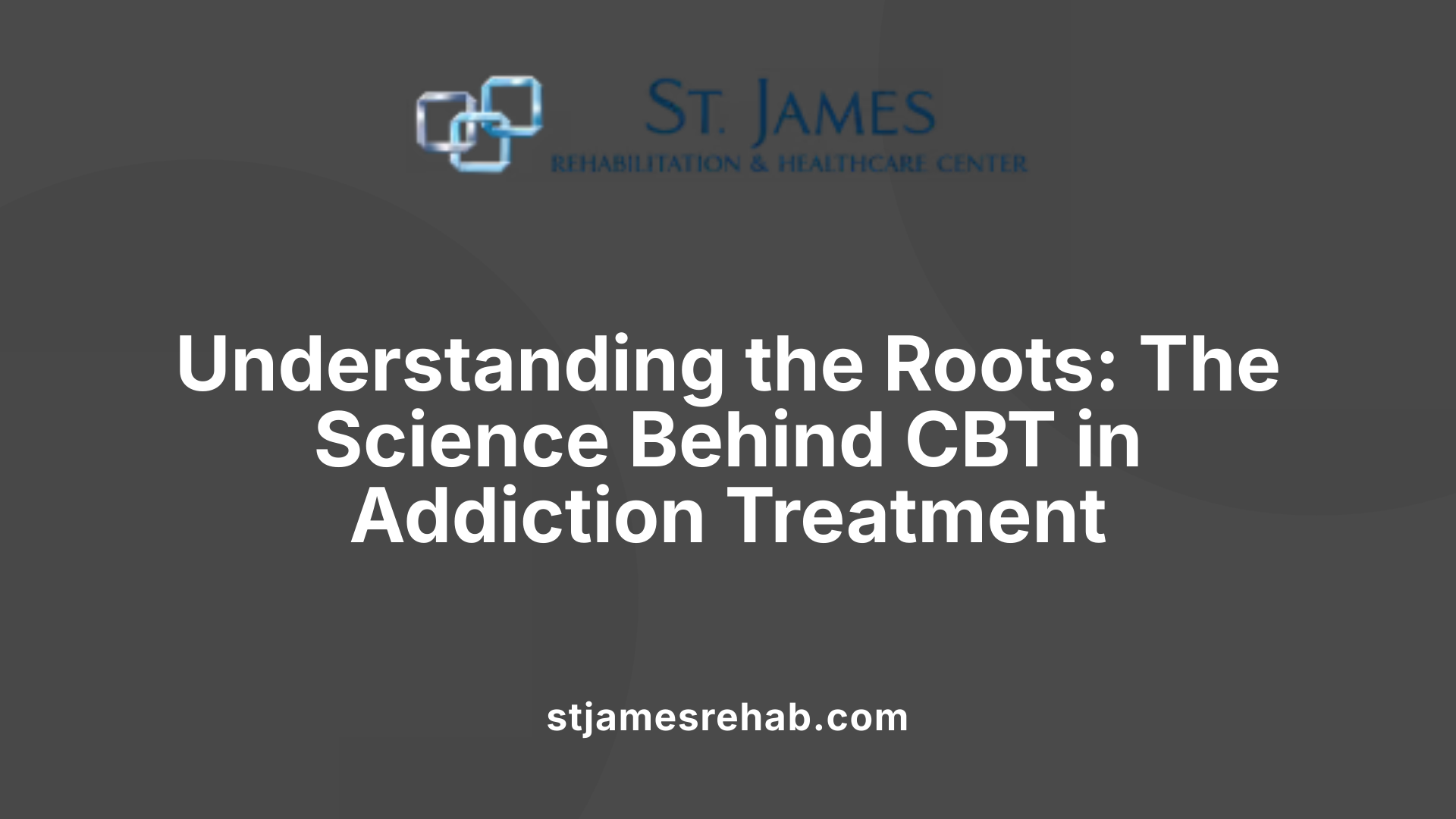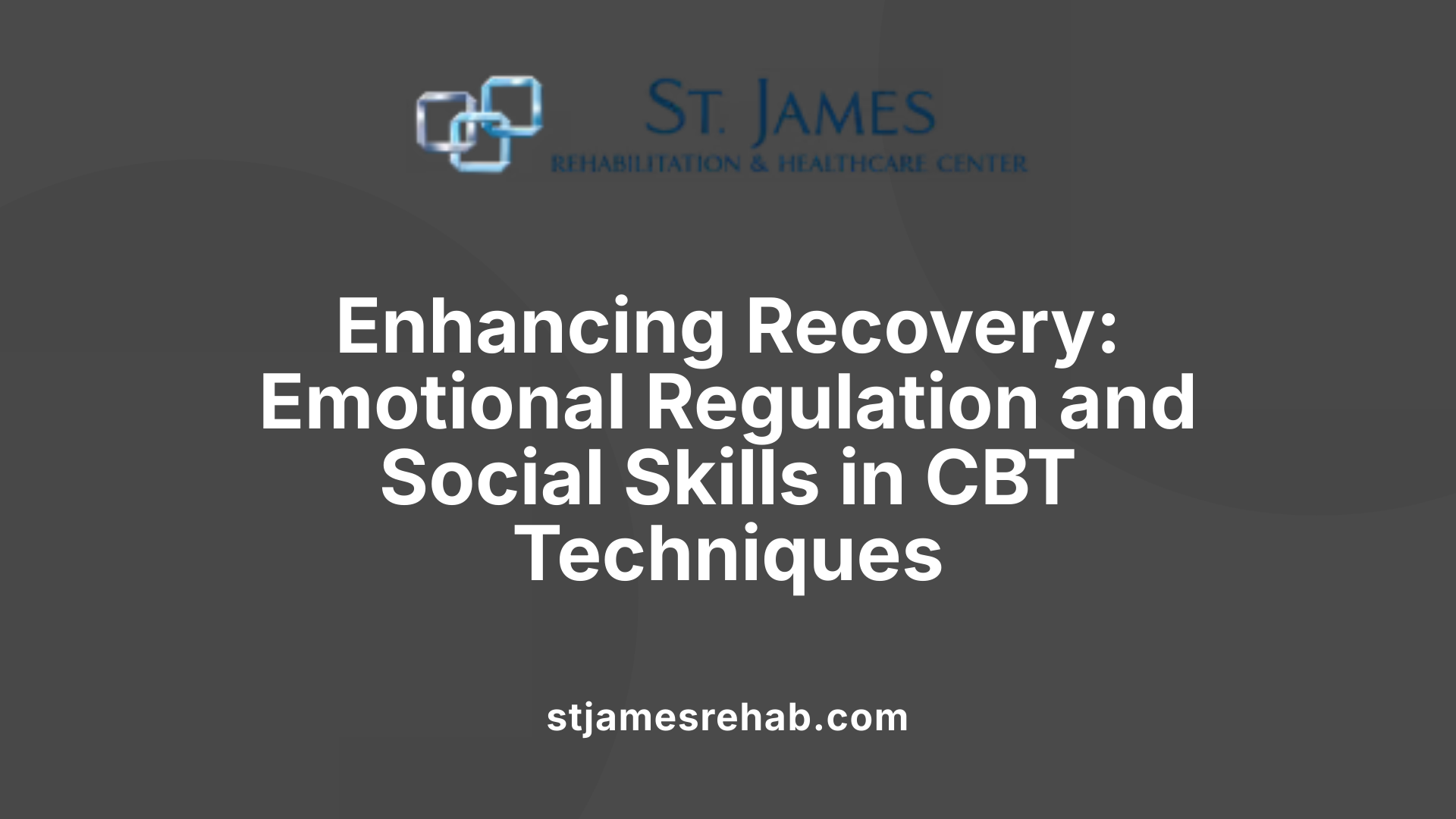Why Cognitive Behavioral Therapy Is Used in Rehab Settings
Harnessing CBT for Long-Term Recovery in Rehab

Unlocking the Power of Cognitive Behavioral Therapy in Addiction Rehabilitation
Cognitive Behavioral Therapy (CBT) has established itself as a cornerstone in addiction treatment within rehab settings, owing to its proven effectiveness and versatile application. Developed in the 1960s by psychiatrist Aaron Beck, CBT specializes in identifying and transforming maladaptive thought patterns and behaviors that sustain substance use. Its goal is to empower individuals with skills and strategies that foster long-term recovery, emotional regulation, and improved social functioning. This article explores why CBT is integral to rehab programs, its theoretical foundations, key techniques, and proven benefits.
Purpose and Rationale of Using CBT in Rehab Settings

What is the purpose and rationale of using cognitive behavioral therapy (CBT) in rehabilitation settings?
Cognitive Behavioral Therapy (CBT) is a prominent approach in addiction treatment that focuses on identifying and altering harmful thought patterns and behaviors. Its main purpose is to help individuals understand the connections between their thoughts, feelings, and actions, especially those driving substance use.
In rehab settings, CBT works by increasing awareness of cognitive and environmental triggers that lead to drug or alcohol use. This understanding enables clients to recognize distorted or negative thinking that may prompt cravings or risky behavior. Therapy then guides them to challenge and reframe these thoughts, reducing their power and influence.
CBT emphasizes developing practical coping mechanisms to handle high-risk situations, manage emotional distress, and resist urges. Techniques like craving management, emotional regulation, and refusal skills are tailored to each person’s needs.
Research supports CBT as an effective, evidence-based, goal-oriented method. It combines psychoeducation, skills training, and behavioral interventions that empower individuals for long-term recovery.
Overall, the use of CBT in rehab aims to foster resilience, support sustained abstinence, and promote overall psychological well-being. This approach not only reduces the risk of relapse but also helps individuals regain control over their lives, improving their functioning and quality of life.
Theoretical Foundations of CBT in Rehabilitation

What is the theoretical basis for applying CBT in rehabs?
Cognitive-behavioral therapy (CBT) in rehab settings is rooted in both behavioral and cognitive theories that explain how substance use behaviors are learned, maintained, and changed.
Behavioral theories, including classical and operant conditioning, provide a framework for understanding addiction as a result of learned responses. Classical conditioning explains how environmental cues—such as locations or people—become associated with drug use, triggering cravings and risky behaviors. Operant conditioning emphasizes the role of reinforcement in sustaining substance use; positive or negative reinforcement strengthens drug-seeking and consumption.
CBT targets these learned patterns through strategies like cue exposure to diminish the power of environmental triggers and contingency management that rewards abstinence.
On the cognitive side, theories focus on how distorted thinking, beliefs, and cognitive biases contribute to addiction’s persistence. Individuals may develop maladaptive thoughts—such as justifications for drug use or minimizing its harms—that reinforce their behaviors.
Cognitive restructuring, a core CBT technique, helps clients identify, challenge, and modify these dysfunctional thoughts, fostering healthier thinking patterns.
The integration of behavioral and cognitive models provides a comprehensive approach to treatment. It allows therapists to address both the external stimuli maintaining substance use and the internal thought processes that lead to continued use.
Empirical research underscores the effectiveness of this combined approach, demonstrating that modifying both cognitive distortions and learned behaviors can significantly reduce substance use and support sustained recovery.
Overall, CBT in rehab is based on the idea that by changing thought patterns and altering learned responses to triggers, individuals can develop better coping skills, prevent relapse, and achieve long-term sobriety.
Effectiveness and Benefits of CBT in Addiction Recovery

What are the benefits and effectiveness of CBT in addiction treatment and recovery?
Cognitive Behavioral Therapy (CBT) is highly regarded as an evidence-based approach for treating addiction. Multiple meta-analyses support its use, showing moderate effect sizes (around d = 0.45), indicating significant improvements in reducing substance use across various types including alcohol, cannabis, cocaine, and opioids.
CBT helps individuals manage cravings and identify behavioral triggers through techniques like functional analysis and cognitive restructuring. These strategies improve emotional regulation and psychosocial functioning, leading to better long-term recovery outcomes.
The structured nature of CBT allows for practical skill-building such as relapse prevention planning, coping strategies, and behavioral modifications. Its focus on present thoughts and behaviors enables clients to develop healthier responses, reducing the likelihood of relapse.
When combined with other treatments such as medication or contingency management, CBT’s effectiveness increases further. Digital platforms and online modules are expanding access to this therapy, making it more adaptable for diverse needs.
Overall, CBT’s systematic and goal-oriented approach addresses the psychological roots of addiction, providing clients with lasting tools for sobriety and emotional resilience.
Techniques and Mechanisms of CBT in Rehab Contexts
Cognitive-behavioral therapy (CBT) utilizes a diverse set of techniques and mechanisms to facilitate recovery from substance use disorders in rehab settings.
One fundamental approach is cognitive restructuring, which challenges and modifies maladaptive thoughts that contribute to addictive behaviors. This process often involves thought records and reframing exercises to help individuals recognize distorted thinking patterns.
Behavioral experiments and exposure therapy are also commonly employed. These techniques help reduce cravings and anxiety by gradually exposing individuals to triggers or high-risk situations in a controlled manner, enabling them to build tolerance and develop healthier responses.
Skills training forms a core component of CBT in addiction recovery. Clients learn coping strategies to manage stress, cravings, and emotional distress. Problem-solving skills are fostered to navigate difficult situations without resorting to substance use. Refusal skills are practiced through role-playing, empowering individuals to confidently decline substances in social settings.
Relapse prevention planning is integral to CBT, focusing on identifying personal triggers and developing tailored strategies to cope with them. Clients are taught to recognize early warning signs and apply practical responses to avoid returning to substance use.
In addition to cognitive and behavioral techniques, mindfulness and relaxation exercises are used to enhance emotional regulation and resilience. Motivational strategies, such as Motivational Interviewing, and contingency management further support engagement and reinforce positive behaviors.
Overall, CBT’s combination of cognitive restructuring, behavioral techniques, and skill development actively addresses the environmental, emotional, and psychological factors influencing addiction. This comprehensive approach aims to foster sustained recovery and long-term sobriety.
Supportive Strategies and Social Skills Development in CBT

How does CBT help develop emotional regulation and mindfulness?
Cognitive-behavioral therapy (CBT) emphasizes teaching clients techniques like mindfulness and emotional regulation to manage stress and cravings effectively. Mindfulness exercises help individuals stay present and aware of their thoughts and feelings without judgment. This awareness allows them to recognize early signs of distress or triggers, fostering calm and focused responses.
Emotional regulation strategies, such as deep breathing, guided imagery, and relaxation techniques, enable clients to control their emotional reactions. These skills are crucial for reducing impulsivity and enhancing resilience during high-risk situations, preventing relapse.
What types of social skills training are incorporated into CBT?
CBT often includes social skills training tailored to improve communication, assertiveness, and interpersonal relationships. Through role-playing, clients practice expressing their needs and setting boundaries effectively. This training aims to rebuild trust and improve relationships strained by addiction.
Enhancing social competence not only eases daily interactions but also provides a strong support network, which is vital for sustained recovery. Better social skills can reduce feelings of isolation and increase confidence in handling social settings.
How does CBT support relapse prevention through communication and skill-building?
A central part of CBT’s relapse prevention approach involves developing effective communication skills. Patients learn how to express their needs and frustrations healthily, avoiding misunderstandings that might lead to stress or substance use.
Beyond communication, clients acquire coping strategies such as problem-solving and recognizing high-risk cues. They also learn how to implement relapse prevention plans, including identifying early warning signs and developing response strategies.
By strengthening these skills, CBT helps individuals build a supportive environment and maintain motivation for sobriety. The focus remains on practical, actionable techniques that support long-term recovery and resilience.
Integration of CBT with Other Treatment Modalities and Future Directions
 Cognitive-behavioral therapy (CBT) is often combined with medication and other therapeutic approaches for enhanced effectiveness in treating substance use disorders (SUDs). This integrated approach helps address both the psychological and biological aspects of addiction. For instance, pairing CBT with medication-assisted treatment (MAT) like methadone or buprenorphine can improve outcomes by reducing cravings while modifying thought patterns.
Cognitive-behavioral therapy (CBT) is often combined with medication and other therapeutic approaches for enhanced effectiveness in treating substance use disorders (SUDs). This integrated approach helps address both the psychological and biological aspects of addiction. For instance, pairing CBT with medication-assisted treatment (MAT) like methadone or buprenorphine can improve outcomes by reducing cravings while modifying thought patterns.
Furthermore, CBT is frequently used alongside other therapies such as Motivational Interviewing and Dialectical Behavior Therapy (DBT). This combination enriches the treatment process by addressing emotional regulation issues and strengthening motivation for change.
Looking ahead, digital platforms are playing a growing role in making CBT more accessible and convenient. Mobile apps, online programs, and virtual therapy sessions enable continuous support, track progress, and provide real-time coping strategies. These innovations expand the reach of CBT, especially for individuals in remote or underserved areas.
Personalized treatment protocols are also gaining prominence. Leveraging data and research, clinicians tailor CBT interventions to individual needs, considering specific triggers, mental health conditions, and personal goals. Such customization enhances engagement and efficacy.
Ongoing research continues to refine CBT methods, exploring new techniques like mindfulness integration and neurofeedback. This ongoing development aims to further solidify CBT’s role in the future landscape of addiction treatment, ensuring it remains adaptable and effective amidst evolving healthcare needs.
Long-Term Impact and Practical Outcomes of CBT in Rehab

Lasting Skills Development
Cognitive-behavioral therapy (CBT) equips individuals with practical skills that support long-term recovery. These skills include emotional regulation techniques, effective communication, and coping strategies to handle high-risk situations.
Reduced Relapse Rates
Research shows CBT significantly lowers the likelihood of relapse by helping clients identify and manage triggers early. Techniques like relapse prevention planning and cognitive restructuring foster resilience.
Improvements in Mental Health and Social Functioning
CBT not only addresses substance use but also improves co-occurring mental health conditions such as anxiety and depression. Clients often experience better relationships, increased self-esteem, and more stable emotional health.
Client Testimonials and Case Examples
Many individuals report feeling more in control and optimistic about their recovery after CBT. For example, a client at a rehab center shared how learning to reframe negative thoughts helped them resist cravings and rebuild trust with loved ones.
This sustained growth underscores the importance of CBT in lasting addiction recovery, empowering clients with the tools needed for a healthier and more balanced life.
Empowering Recovery with Evidence-Based Techniques
Cognitive Behavioral Therapy’s structured and adaptable approach makes it a vital component in rehabilitation settings. Its focus on present issues, skill development, and relapses prevention helps individuals build resilient, healthier lives beyond initial recovery. Ongoing innovations and integrations with digital tools promise to enhance its reach and effectiveness, securing CBT’s role as a cornerstone in the future of addiction treatment.
References
- Cognitive-Behavioral Therapy (CBT) for Addiction Treatment
- Cognitive-Behavioral Therapy for Substance Use Disorders
- The Importance of Cognitive Behavioral Therapy in Rehab
- Why Consider CBT for Recovery? | CBT for Addiction | NC
- Chapter 4—Brief Cognitive-Behavioral Therapy
- How CBT Improves Addiction Treatment Outcomes
- Cognitive Behavioral Therapy in Drug Rehab
- Harnessing Cognitive Behavioral Therapy in High-End ...
- Cognitive Behavioural Therapy | CBT for addiction treatment
- Cognitive Behavioral Therapy for Addiction: Techniques





